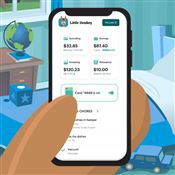How to Invest in Stocks as a Teenager
Investing isn't just for adults anymore. But how exactly do you go about investing when you're still in school? Find out in this detailed guide.
 |
Investing as a teen can feel daunting. Truthfully, it can feel daunting at any age if you've never done it before.
Luckily, it's never been easier to invest in the stock market.
If you're a teen looking to invest in stocks, you've come to the right place. In this guide, find out how to invest in the stock market, the best investing accounts for teens, and other investments to consider.
How to Invest in Stocks as a Teenager
 |
Legally, you must be at least 18 years old to start investing in stocks.
Fortunately, you can get around this obstacle, and you'll learn how below. But that's just one of the steps to investing as a teenager.
The 5 steps to investing in stocks as a teen are:
- Learn the basics
- Calculate your budget
- Choose your brokerage
- Pick your stocks
- Watch your stocks
Let's get started by dipping our toes into the fundamentals of stock investing.
1. Learn the basics about stocks
Getting started investing can be a lot of fun, but if you're feeling a bit scared, that's normal too.
The best way to start is to learn the basics of the stock market and investments.
You can find plenty of free resources online, and when you finish, you'll want to better understand concepts like dividends and average stock market returns.
2. Choose Your Budget
Back when your parents started investing, they had to have hundreds or thousands of dollars. Then they'd have to speak with someone who probably wore a suit and tie.
But you can start investing with just $20, or even less. And you can start at home in a few minutes with your parents' help.
What money could you set aside to invest today?
Remember: You want to keep this money invested for years, so it should be money you won't need for a while.
If you have $100, that's more than enough to get started with your first brokerage account.
3. Open Your Account (Custodial vs. Brokerage)
The law requires you to be 18 years old to open a brokerage account. But if you're under 18, you can still invest in stocks with a custodial account.
What is a Custodial Account?
A custodial account is an investment account opened in a minor's name but managed by an adult. The minor then owns it once they turn 18 or 21, depending on the laws in your state.
With a custodial account, teens can invest like everyone else.
There are several laws related to creating custodial accounts, including the Uniform Gifts to Minors Act (UGMA) and Uniform Transfers to Minors Act (UTMA). UGMA and UTMA accounts have slightly different rules and capabilities, but they both allow custodial accounts to be created for people under 18.
How do Custodial Accounts get funded?
Custodial accounts are funded through "gifts," which are typically limited to around $15,000 per child per year.
These gifts don't have to be made by the parent who opened the account; it could be a grandparent or another relative, for example. The parent is acting as the caretaker of the money until the teenager reaches the required age to access the money directly.
How do you buy stocks through a Custodial Account?
Investing as a teen is, by necessity, a little bit indirect. Once you've opened a custodial account with a parent or guardian, they'll be the ones who have to do the investing, at least until you reach the age necessary to do it yourself.
Essentially, what this means is that you, or you and your parent working together, can figure out what stocks to invest in, and then they will be the ones to work with your broker to execute the trades.
How to pick the right Custodial Account for you?
There are a lot of great custodial accounts to choose from, and you can learn about them below. But there are some general things to look out for.
- Types of investments: Choose a brokerage that has the stocks you want to invest in, as well as other investments like mutual funds, ETFs, and more.
- Types of accounts available: You can choose between a taxable or retirement account.
- Fees: Some are free, others charge you to invest.
- Minimum balance requirements: Some let you start with $0, but some require a minimum balance.
- Platform and tools: Which interface has the tools you need?
Keep these criteria in mind as you read through the brokerage accounts below to see which best fits you.
4. Purchase Your First Stocks
Now comes the fun part, choosing your first stocks. You can consider a few questions when you're thinking about what to invest in.
- What are your interests? For example, if you like tech stuff, maybe Apple or Google would be a good start.
- What companies make products for you and your friends? For example, if you wear Nike shoes or eat out at Chipotle, both have stocks you could invest in.
- Where do your family members work? For example, if your family works at Amazon, you could invest in their stock.
Once you have a few stocks you like, you'll want to do some research to better understand the companies you're interested in.
Every company has to report how much money they make and how much they owe, and you can find their annual reports online.
You can get an overview of the finances of a company on sites like YahooFinance and MarketWatch.
5. Watch Your Portfolio
Now that you've bought your first investments, you can watch them and see if you are making money.
The best investment apps let you track your stock's performance in cool-looking charts and graphs.
Warning: One word of caution is that it can be common to get scared when you're investments go down. Many people pull out their investments at this time, and this can be a big mistake.
Stock prices can go down as much as 10% or 20% in a year, and that's completely normal.
Remember: If you've chosen companies that you think will continue to grow for many years, then many advisors might tell you to continue to hold your investments.
All investments have risk, and it's not uncommon for someone to lose a good portion of their money. But the stock market has consistently risen over its history, so if you stay in the market, then your odds of success rise.
As you monitor your portfolio over the coming weeks and months, you'll learn valuable lessons about being an investor. This could also give you ideas about what to invest in next.
The Best Investment Platforms for Teens
Now that you know the 5 steps to invest and what custodial accounts are, you're probably wondering what your options are. There are many custodial accounts online, but here's a quick look at some of the best.
All Ages - Banking and Invest in One App
- Flexible controls, spending notifications, in-app chore list
- Age: No minimum age
- Fees: Starts at $5.99/month, per family (up to 5 kids). $10.98/month for Greenlight Max. $15.98/month for Greenlight Infinity. $24.98/month for Greenlight Family Shield.
Charles Schwab
With Charles Schwab, you can open a UTMA or UGMA custodial account with all the same perks of a regular investing account. You get access to various investments, like ETFs and mutual funds, with no monthly fees and minimum balance.
There is a $4.95 fee for regular trades, but that shouldn't prove too much of a burden, assuming you don't trade too often and take advantage of Charles Schwab's free trading options.
TD Ameritrade
TD Ameritrade also offers UTMA and UGMA custodial accounts for teens, with no minimum balance. TD Ameritrade's thinkorswim trading platform is an excellent option if your teen wants to experience a real, professional platform.
There may be a learning curve, but with time and a little practice, you'll soon find yourself comfortable trading anywhere.
Greenlight
Compared to other platforms listed here, Greenlight is a bit unusual. It's an app designed for teaching kids and teens financial literacy, including investing.
Greenlight users don't invest through custodial accounts. Instead, Greenlight accounts are regular brokerage accounts created in the parents' name but accessible to their kids.
Parents can approve every trade through their app. Overall, though, Greenlight allows for a bit more independence than other options here. Greenlight has plans with monthly fees ranging from $5.99 to $24.98 per month.
Acorns
It's quick and easy to open a UTMA or UGMA custodial account with Acorns Early Invest, which comes along with a financial wellness system, checking, and retirement accounts as well.
This Acorns Early Invest account combines financial literacy tools with investing and savings. You also get bonuses when you invest with certain Acorns partners. Acorns Early Invest is part of the Acorns Gold plan, which comes in at $12 per month, and supports multiple kids at no added expense.
M1 Finance
M1 Finance clients can open custodial accounts for teens, such as UTMA or UGMA accounts.
M1 charges $0 trading commissions and focuses on automated investing using their trademark Pies, selections of securities made up of stocks and ETFs (which you can put together yourself), or choose from their ready-made Model Portfolios.
If you're new to investing, consider a paper trading account. Many apps offer demo trading accounts like Webull. These accounts mimic the real stock market, usually with real-time, accurate data, but allow you to practice trading with fake money. It's a safe way to get used to trading and see the effects of your decisions without worrying about losing your investment.
Custodial Account vs. Investing App Taxes
As a teen, taxes are probably the furthest thing from your mind. But you can save thousands of dollars by investing in accounts with tax advantages.
The good news is: You pay fewer taxes than your parents if you aren't earning income.
Custodial Account Taxes
If you're under 19 years of age, here are the taxes you'll owe on the income from your investments:
- $0 - $1,050 in income: 0% taxes
- $1,050 - $2,100 in income: 10% taxes
- +$2,100 in income: Your parents' marginal tax rate (as high as 37%)
You can save money on taxes by investing in a retirement account.
Custodial Retirement Accounts (Traditional vs Roth)
Your retirement probably sounds like a lifetime away, but investing small amounts for retirement now could make you a millionaire.
If you just invest $45 a month starting at the age of 20, you could be a millionaire by age 65.
That's why some people call retirement accounts "millionaire accounts."
An IRA is one type of retirement account you can invest in as a teen. It stands for an individual retirement account.
There are two types of IRAs:
- Traditional IRA: You don't have to pay taxes on these investments until you withdraw your money.
- Roth IRA: You pay tax on these investments now, but you don't have to pay taxes when you withdraw your money.
The only requirement to start an IRA is earning some income. This can be from a part-time job or even mowing lawns.
Bottom Line
There are plenty of options out there for teens looking to invest. If you can't wait and want to try out investing right away, consider opening a paper trading account to get a feel for what real trading is like.
If you're playing with fake money on a platform that supports it, you might even consider making a few trades on margin (that's leverage), just to see how frighteningly fast you can go from broke to rich to deep financial trouble if you aren't careful.
Whatever you choose, you'll need the cooperation and consent of your parents or guardians, but it's easy to see how getting started early can provide long-term benefits toward a healthy financial future.
Jeremy Harshman is a creative assistant at CreditDonkey, a personal finance comparison and reviews website. Write to Jeremy Harshman at jeremy.harshman@creditdonkey.com. Follow us on Twitter and Facebook for our latest posts.
Note: This website is made possible through financial relationships with some of the products and services mentioned on this site. We may receive compensation if you shop through links in our content. You do not have to use our links, but you help support CreditDonkey if you do.
|
|
| ||||||
|
|
|













